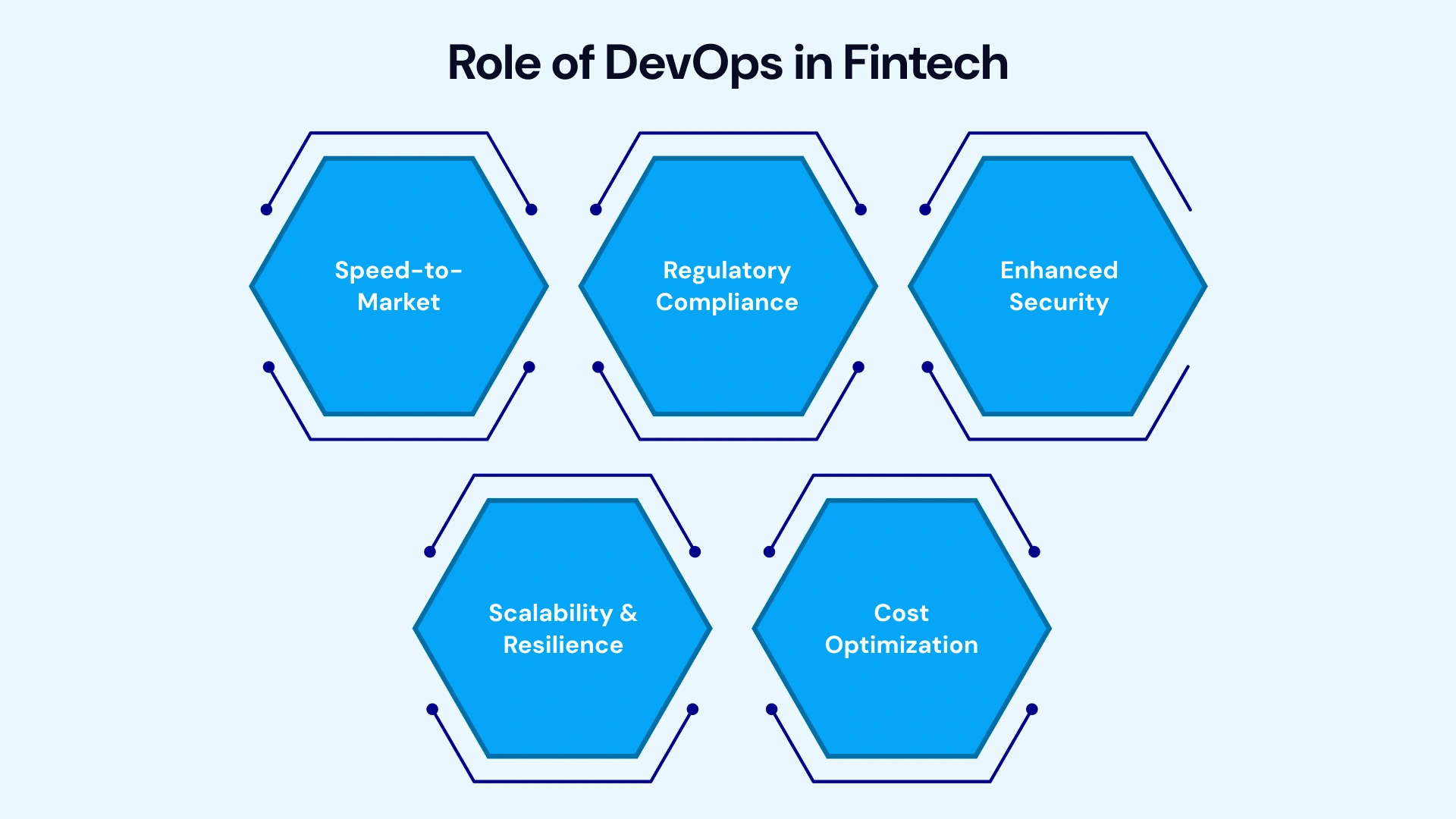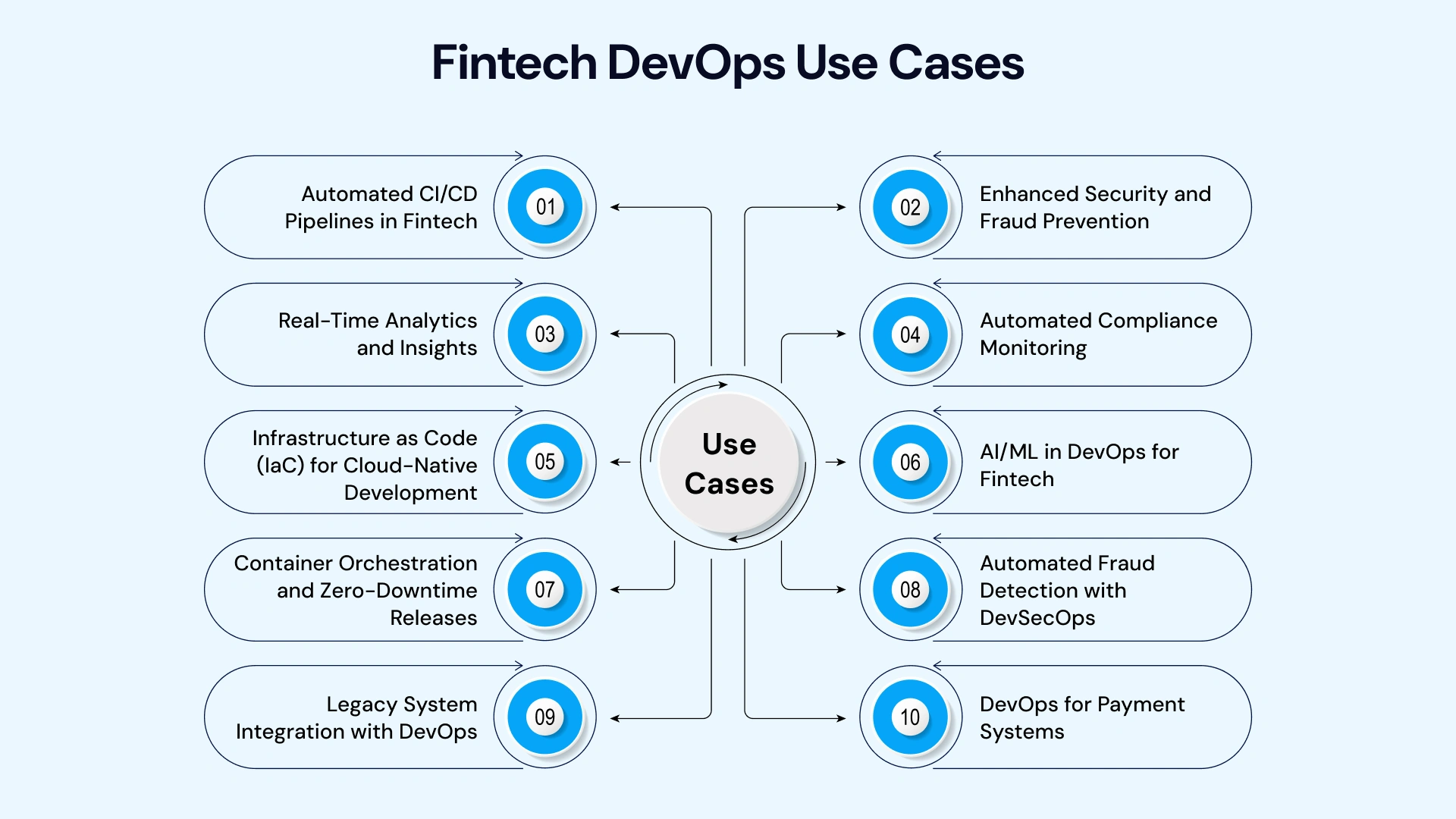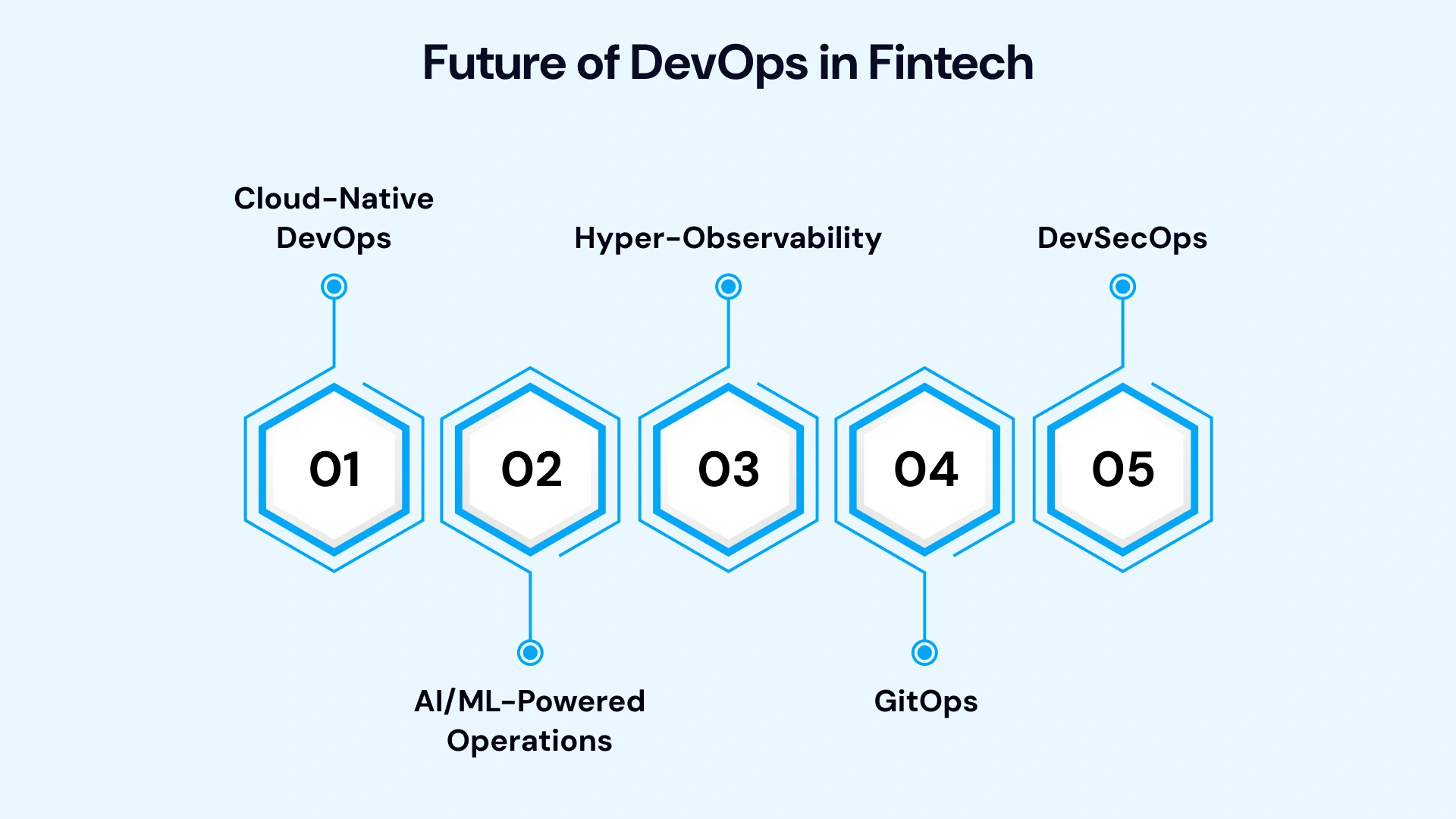The financial services industry is in the midst of a profound transformation. Legacy institutions and agile fintech startups alike face unprecedented pressure to innovate at lightning speed while maintaining impeccable security, compliance, and customer trust.
For fintech firms, where every millisecond of downtime can translate into millions of dollars in losses and a loss of customer confidence, this velocity and stability are priceless. This comprehensive blog delves into 10 critical Fintech DevOps use cases, detailing how they deliver tangible, quantifiable ROI.
Why DevOps Matters in Fintech
Fintech organizations are digital-first by nature, handling billions of transactions daily across a complex ecosystem of mobile banking, digital payments, and investment platforms. These applications must be available 24/7, highly scalable, and fortified against a constant barrage of cyber threats. Traditional, siloed IT models are simply too slow and risk-averse to meet these demands.
Here’s why the role of DevOps in Fintech applications is indispensable:

- Speed-to-Market: The ability to release new features rapidly is a key competitive advantage. Agile development in fintech enables firms to respond to market shifts and consumer demands more quickly than ever.
- Regulatory Compliance: The financial industry is one of the most heavily regulated. DevOps provides a framework for embedding automated compliance checks and monitoring directly into the development lifecycle, reducing legal and financial risks.
- Enhanced Security: In financial services, DevSecOps is no longer an afterthought; it’s a foundational principle. It ensures security is "shifted left," enabling automated security workflows and continuous vulnerability scanning.
- Scalability & Resilience: As user bases grow, so do the demands on infrastructure. Cloud infrastructure services and a container orchestration platform like Kubernetes in financial services DevOps enable firms to build resilient and scalable infrastructures with a zero-downtime infrastructure capability.
- Cost Optimization: The ROI of DevOps in fintech is not just an abstract concept. It’s a direct result of reduced operational costs, faster development cycles, and minimized downtime.
10 Fintech DevOps Use Cases
Here's a breakdown of the key use cases for DevOps in fintech, each contributing to speed, security, and efficiency.

1. Automated CI/CD Pipelines in Fintech
The foundational use case for DevOps in fintech is the implementation of Continuous Integration and Continuous Deployment (CI/CD) pipelines. These automated pipelines streamline the process from code commit to production, eliminating manual handoffs and reducing the risk of human error.
For fintech, this means a new feature; such as a mobile wallet enhancement or a new lending product, can go from an idea to a live application in hours, not weeks.
ROI Impact:
- 40-60% faster time-to-market for new products and features, directly impacting revenue and market share.
- 25% reduction in operational costs by automating repetitive tasks, freeing up highly-skilled engineers to focus on innovation.
- Increased customer satisfaction through frequent, seamless updates that address user feedback and introduce new value.
2. Enhanced Security and Fraud Prevention
In an industry where a single data breach can lead to catastrophic financial losses and reputational damage, security must be proactive, not reactive. Integrating DevSecOps in financial services is a paramount use case for DevOps in financial services. This practice embeds security tools and processes directly into the CI/CD pipeline, from initial code commits to final deployment.
This enables continuous threat modeling, secure code scanning, and the immediate identification and remediation of vulnerabilities. Furthermore, this approach can be a powerful catalyst for adopting AI-based fraud detection and ML-based fraud detection systems that learn and adapt to new threats in real-time.
ROI Impact:
- Millions of dollars in annual savings by preventing sophisticated fraud attempts before they occur.
- A significant decrease in mean time to resolution (MTTR) for security incidents, from days to minutes.
- Enhanced trust and brand reputation, resulting in higher customer retention rates and a competitive edge in a market where consumers prioritize data security.
3. Real-Time Analytics and Insights
Fintech applications are a goldmine of data: transactional data, user behavior data, and system performance data. A robust Fintech DevOps use case is the ability to collect, analyze, and act on this data in real time.
Log management and monitoring fintech apps is a crucial practice that enables teams to detect performance anomalies, identify potential security threats, and gain deep insights into application usage.
ROI Impact:
- 70% improvement in performance monitoring accuracy, allowing teams to predict and prevent system outages.
- A 40% reduction in unexpected downtime costs, which in the financial services sector can average up to $300,000 per hour.
- Enables personalized financial services, leveraging insights to boost customer engagement and, in turn, Customer Lifetime Value (CLTV).
4. Automated Compliance Monitoring
Regulatory compliance is a constant, evolving challenge for financial institutions operating in the US and Canadian markets. From PCI DSS to GDPR and regional regulations, adherence is mandatory. This is where automated compliance monitoring becomes a game-changer.
By using Infrastructure as Code and other automated tools, fintech firms can codify compliance policies and embed them into the CI/CD pipeline. Every change is automatically checked against the policy, creating an immutable audit trail and ensuring adherence.
ROI Impact:
- Saves up to $4.5 million annually in potential non-compliance penalties.
- Reduces manual audit preparation time by 50%, reallocating valuable legal and technical resources.
- Strengthens investor and stakeholder trust by demonstrating a proactive, systematic approach to governance.
5. Infrastructure as Code (IaC) for Cloud-Native Development
The move to the cloud is essential for modern fintech. Cloud-native development practices, powered by IaC, allow teams to provision and manage IT infrastructure transformation using code rather than manual processes. This ensures consistency, repeatability, and scalability across multi-cloud environments.
The goal is a resilient and scalable infrastructure that can handle explosive growth without breaking. This Fintech DevOps use case is particularly vital for a zero-downtime infrastructure strategy.
ROI Impact:
- Improves DevOps team efficiency by 30%, as they can provision complex environments in minutes rather than days.
- Reduces infrastructure operational expenses by 20-35% through optimized resource utilization.
- Facilitates seamless integration of legacy systems with DevOps, modernizing the organization's backbone without a complete rip-and-replace approach.
6. AI/ML in DevOps for Fintech
The future of DevOps is intelligent. From Automated Fraud Detection to predictive analytics, integrating AI/ML in DevOps for fintech CTOs’ applications adds a layer of intelligence that traditional methods cannot match.
AI-powered tools can predict potential system failures, optimize resource allocation, and detect subtle anomalies that signal fraudulent activity. Many DevOps consulting services are now specializing in building these intelligent pipelines.
ROI Impact:
- Fraud prevention ROI is estimated at a 50-70% cost reduction annually by stopping fraud in its tracks.
- Predictive scaling reduces cloud costs by up to 25%, as resources are allocated precisely when and where they are needed.
- Boosts developer productivity by 20% by automating complex debugging and troubleshooting.
7. Container Orchestration and Zero-Downtime Releases
Digital banks and payment platforms require uninterrupted service, which makes a container orchestration platform like Kubernetes a critical tool. Kubernetes in financial services DevOps enables the deployment of new features without any downtime.
Containers package applications and their dependencies, ensuring they run consistently across any environment. This Fintech DevOps use case is a fundamental component of building a zero-downtime infrastructure.
ROI Impact:
- Reduces downtime costs, which, as noted, are substantial in the financial services industry.
- Builds customer trust and loyalty by guaranteeing continuous service availability.
- Accelerates the release of high-volume updates and new services without disrupting the production environment.
8. Automated Fraud Detection with DevSecOps
The threat of fraud is pervasive, resulting in billions of dollars in annual losses. A dedicated Fintech DevOps use case for fighting this is integrating Automated fraud detection into every layer of the application.
By leveraging AI-based and ML-based fraud detection, firms can analyze billions of data points in real-time, identifying suspicious transactions and patterns with unprecedented accuracy. This is a core pillar of a mature DevSecOps practice.
ROI Impact:
- Cuts fraud-related losses by 60% year-over-year.
- Enhances compliance postures by providing end-to-end traceability of all transactions.
- Reduces claims processing time by 40%, improving both operational efficiency and customer experience.
9. Legacy System Integration with DevOps
Many financial institutions are built on decades-old, monolithic mainframe systems. The challenge is to modernize and connect these systems to new, cloud-native development applications.
Legacy system integration with DevOps is a powerful use case for DevOps in financial services. It uses DevOps principles and APIs to create automated pipelines that bridge old and new technologies, allowing for a phased, low-risk digital transformation.
ROI Impact:
- Cuts IT maintenance costs by up to 35%, avoiding the high cost and complexity of a complete system replacement.
- Extends the usability of core systems, providing a longer runway for innovation.
- Facilitates a smooth transition to modern architectures, such as microservices, without disrupting mission-critical services.
10. DevOps for Payment Systems
Payment systems demand the highest levels of speed, reliability, and security. DevOps for payment systems is a specialized and critical use case of DevOps in financial services. By employing advanced log management and monitoring fintech apps, automated testing, and a robust container orchestration platform, firms can ensure their payment gateways are always available and secure.
ROI Impact:
- Supports 24/7 availability, a non-negotiable requirement for a global, interconnected economy.
- Reduces chargebacks and other transaction-related issues due to faster and more accurate fraud detection.
- Elevates customer trust by ensuring a seamless, reliable, and secure checkout experience.
By implementing these Fintech DevOps use cases, organizations can move beyond traditional IT silos to a fully integrated and automated ecosystem. The result is a more resilient, secure, and agile financial platform that can adapt to changing market demands and deliver superior customer experiences while providing a clear and measurable ROI of DevOps in fintech.
The Quantifiable Benefits of DevOps in Fintech
The benefits of DevOps in the fintech industry extend beyond mere operational efficiency. They translate into tangible, measurable ROI of DevOps in fintech.
- Accelerated Innovation Cycles: Agile development in fintech allows firms to deploy new features and products at an unimaginable pace. Right DevOps engineers use this to reduce time-to-market and will enable companies to capture new revenue streams quickly.
- Cost Optimization: Automation of repetitive tasks reduces manual labor, while efficient resource utilization, made possible by cloud infrastructure services, lowers operational expenses. This leads to direct savings on IT maintenance and infrastructure costs.
- Enhanced Security & Compliance Posture: Integrating security from the start with DevSecOps in financial services drastically reduces vulnerabilities and the potential for costly data breaches. Automated compliance monitoring saves millions in potential fines and legal costs.
- Increased Resilience and Uptime: With zero-downtime infrastructure and proactive monitoring, financial services can offer uninterrupted service, which is critical for maintaining customer trust and avoiding revenue loss from outages.
- Improved Customer Experience: Faster, more reliable, and more secure services directly contribute to higher customer satisfaction, loyalty, and lifetime value.
Challenges of DevOps in Fintech
While the rewards are significant, the road to DevOps maturity in financial services isn’t without its obstacles.
- Legacy Systems Integration: The complexity of integrating decades-old mainframes with modern cloud-native development practices is a significant hurdle. This requires specialized expertise to navigate without disrupting mission-critical services.
- Stringent Regulatory Compliance: The need to adhere to a complex web of regional and global regulations in the US and Canadian markets can slow down deployment processes and create bottlenecks.
- High Upfront Costs: The initial investment in modern cloud infrastructure services, new tools, and training can be substantial for traditional institutions.
- Talent and Skill Shortage: There is a significant scarcity of DevOps professionals with expertise in both financial services and advanced DevOps practices, such as Kubernetes in financial services DevOps, AI/ML in DevOps for fintech, and advanced security automation.
- Cultural Resistance: Shifting from a siloed, traditional IT culture to one of collaboration and shared responsibility is a significant challenge that requires strong leadership and a commitment to change.
The Future of DevOps in Fintech
The DevOps landscape for Fintech CTOs is constantly shifting, with a clear trajectory toward more automation, intelligence, and security. Here's a look at the key trends shaping its future:

- Cloud-Native DevOps
Fintech firms are rapidly moving toward Cloud-Native DevOps, a strategy that fully embraces cloud computing models to build and run scalable applications. This approach leverages serverless computing, where developers can focus on code without managing servers, and microservices, which break down complex applications into smaller, independent services. This enables unparalleled agility and scalability, which are essential for a fast-paced and data-intensive industry.
- AI/ML-Powered Operations
AI and Machine Learning are evolving from supplementary tools into a core part of the DevOps pipeline. In the future, we will see AI enabling predictive analytics to anticipate and prevent system performance issues before they occur. It will also be integral to intelligent security automation, with AI-based fraud detection and automated vulnerability scanning becoming standard practice.
- Hyper-Observability
Beyond simple monitoring, the trend is toward hyper-observability. This isn't just about collecting metrics and logs; it's about understanding the "why" behind issues. By correlating data from various sources, metrics, logs, and traces, hyper-observability provides a deep, holistic view of a system's behavior. This allows teams to not only spot problems but also pinpoint their root causes, leading to faster and more effective problem resolution.
- GitOps
GitOps is a powerful new approach that uses Git; a version control system, as the single source of truth for both application and infrastructure code. This model treats infrastructure just like code, allowing teams to manage and automate infrastructure changes with the same tools they use for application development. The result is streamlined infrastructure management, enhanced end-to-end traceability, and increased stability.
- DevSecOps
In an industry where security is paramount, DevSecOps is becoming the default. This trend embeds security practices directly into every stage of the software development lifecycle, from the very beginning. As cyber threats become more sophisticated, automated security will be mandatory, with continuous security checks, automated threat modeling, and real-time vulnerability scanning integrated into the CI/CD pipeline. This proactive approach ensures that security is not an afterthought, but a foundational element of all financial software development.
Transform Your Fintech with VLink's DevOps Expertise
Realizing the full potential of DevOps in the fintech industry requires more than just the right tools; it demands a strategic partner with deep domain knowledge. VLink offers specialized DevOps consulting services designed to help CTOs and CIOs navigate the unique complexities of financial services, including stringent compliance, legacy system modernization, and the imperative for airtight security.
We work with you to build a custom roadmap for digital transformation, ensuring your organization can implement these Fintech DevOps use cases and achieve a quantifiable ROI of DevOps in fintech. Our expertise in Cloud-Native DevOps, automated CI/CD pipelines in fintech, and AI/ML in DevOps for fintech allows us to build resilient and scalable infrastructure that drives innovation and secures your competitive advantage in the markets.
Conclusion
The widespread adoption of DevOps in the fintech industry is no longer a strategic option; it’s a necessity for any firm aiming to remain competitive and relevant. By implementing Fintech DevOps use cases, companies can achieve a dramatic improvement in their speed-to-market, security posture, and operational efficiency.
The tangible ROI of DevOps in fintech, from reduced fraud losses and lower infrastructure costs to accelerated innovation, provides a compelling business case for this transformation. While challenges exist, particularly with legacy systems and cultural change, the future trends of intelligent automation and proactive security offer a clear path forward.
As a senior expert in the space, we empower CTOs, CIOs, and product leaders to navigate these complexities. Our financial software development services and specialized DevOps consulting services are tailored to help your organization harness the power of Cloud-Native DevOps, ensure compliance, and build a resilient, secure, and scalable ecosystem.
The future of financial services is being built on a foundation of speed and trust, and DevOps is the blueprint for that foundation. Let us help you create a resilient and scalable infrastructure that drives innovation, ensures security, and delivers a measurable ROI of DevOps in fintech. Reach out today to explore customized DevOps strategies for your financial services ecosystem.










 Shivisha Patel
Shivisha Patel

















